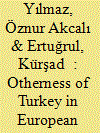| Srl | Item |
| 1 |
ID:
158099


|
|
|
|
|
| Summary/Abstract |
This paper discusses how Turkey’s otherness to European identity, as represented by the European Union (EU), was turned into an asset during the beginning of the AKP rule. To the extent that the AKP represented the Islamic cultural other against both the secular establishment of Turkey and the EU, its promise to fulfill the Copenhagen political criteria and adopt EU norms and standards provided a possibility of ‘a model’ for the EU. This was the promise of a self-transforming cultural other becoming a part of the EU normative order and representing this system in its region. In the period between 2002 and 2005, there was a compromise on Turkey’s projected identity between the EU and the AKP. Yet this early promise and the ensuing compromise could not be sustained and realized in the following phases of the AKP rule. First stagnation between 2005 and 2010 and then a break wasted this promising new beginning.
|
|
|
|
|
|
|
|
|
|
|
|
|
|
|
|
| 2 |
ID:
174017


|
|
|
|
|
| Summary/Abstract |
This article aims to assess the relationship between populism and immigration in the European Union and their impact on EU–Turkey relations. Following a literature review on the current state of populist movements in the EU as well as on the findings of a comparative fieldwork conducted in Germany, France, Italy, Greece and the Netherlands, the article seeks to understand and explain how the debates on migration, refugees, mobility and Islam have an impact on the rise of extreme right-wing populism. Starting with the depiction of the main constituents of populist rhetoric in Europe vis-à-vis migrants and refugees, the article subsequently analyses social-economic, political and cultural drivers of populist extremism, and the resentment against diversity, multiculturalism, Islam, immigration and mobility among the supporters of populist parties in five selected European countries. In the last section of the article, the impact of right-wing populism and Islamophobia on the EU–Turkey relations will be analyzed.
|
|
|
|
|
|
|
|
|
|
|
|
|
|
|
|